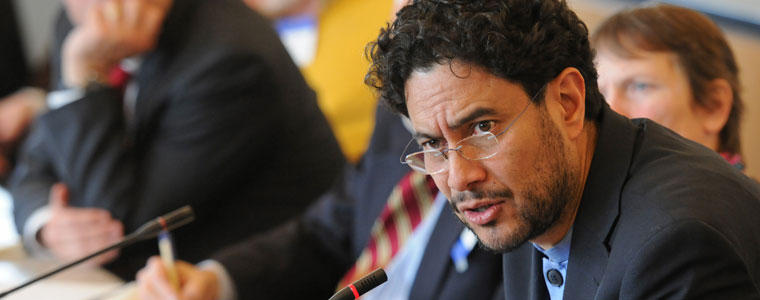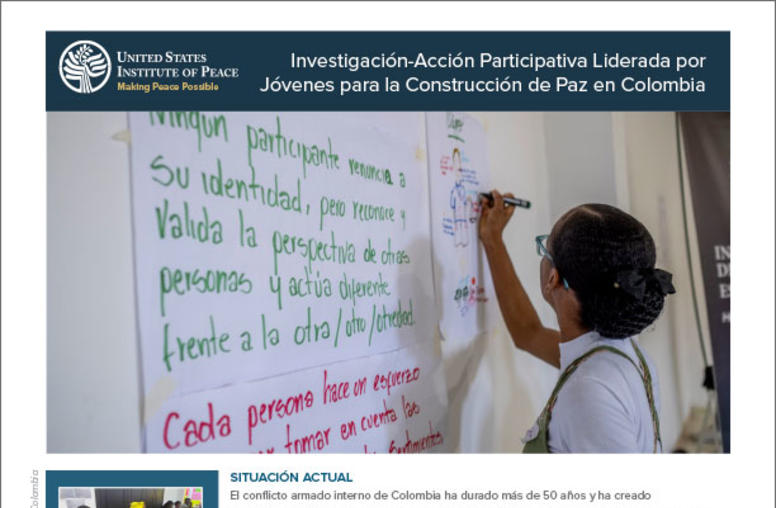
As the government of Colombia and the FARC-EP guerrillas prepare to resume another round of peace talks on April 2, reports from observers and public comments by the parties indicate the two sides are optimistic that they'll reach agreement. The reviews coming in from Havana, where the seventh round of talks was completed last week, suggest the parties have developed a good working rhythm and collegial relations that bode well for an agreement. While there was some disappointment that the last round did not produce the anticipated agreement on the land issue, this does not mean that progress hasn’t been made.
At a recent roundtable discussion at the U.S. Institute of Peace, Colombian Congressman Iván Cepeda, chair of the Peace Commission of the Colombian House of Representatives, shared his optimism that an agreement on the first item on the peace agenda—agrarian development, also broadly referred to as the land issue--would soon be forthcoming. Congressman Cepeda had just returned from Havana, where he was invited, along with five other members of the Peace Commissions of the Colombian Congress, to meet with the negotiating teams. He noted that there have been advances at the table and that the sides seem to be developing more flexible positions.
While agreements have not yet been signed, there are many reasons to be optimistic. First, the parties themselves seem pleased with the rhythm of their work and the progress they are making. They have expressed satisfaction that their pace will produce a final result in a timely manner. Both sides appear committed to moving the process along as quickly as possible.
Second, the parties have announced that they have reached preliminary consensus on agrarian development policy--no small task when one considers that the land issue has been at the heart of the conflict for decades. The parties have different diagnoses and different proposals for addressing the land issue. Nonetheless, the parties today agree that rural poverty continues to be a root cause of the Colombian conflict and that they are prepared to seek transformation of the countryside. Such consensus is a major milestone.
Third, the General Accord for the Ending of Conflict and the Building of a Stable and Durable Peace signed by Colombian government and FARC-EP representatives in August 2012 has provided what has proven to be an effective roadmap for moving forward. They have developed an agenda and a methodology and have begun working their way through the first agenda item and its various subtopics related to land use and access to land, unproductive lands, formalizing landownership, agrarian frontiers and protecting peasant enclaves (zonas de reserva campesina). A week ago, the parties indicated that they had made advances on each of these points.
Government and FARC-EP negotiators Humberto de la Calle and Iván Márquez, respectively, have noted that discrepancies remain between the parties on a variety of positions, including energy and mining policies (and whether these issues should even be considered by the table), foreign land ownership guidelines, the size of permissible landholdings, and the autonomy of the peasant reserves. While such discrepancies have yet to be ironed out, the parties have expressed optimism that these can be resolved in a timely manner.
Confidence Building among the Parties
The parties’ optimism is at least partially due to a web of gestures and actions that they have constructed over the last 2-1/2 years. (See my article on confidence-building mechanisms in the exploratory phase of the talks published in English, Spanish, and Catalan.)
In addition to the quid pro quo of political actions I described in that article, searching for a common vision for the future of Colombia has also helped to consolidate trust at the table. The parties now have a variety of common experiences. They jointly constructed a roadmap and a website. They have socialized over cocktails and dinners during the initial launching of the talks in Oslo and shared cigarettes and Cuban cigars in the corridors of Havana’s convention center.
FARC Commander Iván Márquez and former Colombian Armed Forces chief Gen. Jorge Enrique Mora are said to treat each other with the utmost respect and have reportedly joked about times when their paths crossed on the battlefield. Such exchanges undoubtedly smooth the way for the difficult work of coming to agreements and articulating differences over issues that have been at the root of Colombia's armed conflict for decades. (See María Jimena Duzán's assessment here.)
The parties’ confidence has been tested throughout the process as well. The formation of new teams once the talks became formalized required initiating newcomers into this culture of agreed rules and confidence-building. A press interview given by Enrique Santos Calderón, a participant in the then-secret talks in Havana, unleashed a series of charges by the FARC that Santos had violated the secrecy provisions laid out in the August general framework agreement and therefore the FARC would no longer be bound to secrecy. Ongoing battlefield violence, especially the killing of FARC leader Alfonso Cano and the renewal of violence following the end of the FARC’s unilateral ceasefire in January, has tested the resilience of the process as well as the patience of the public. So far the process is holding up well.
Having a good rapport between the parties is not sufficient in and of itself to resolve differences, but it is an important ingredient that seems to be present in Havana and will help the parties establish and honor mechanisms for moving forward. It also provides a model for the kind of give-and-take and patience that will be required to reconcile the Colombian public once an accord is signed.
An Impatient Public
The pressure to reach agreements at the talks in Havana is intensifying. With presidential elections in the offing for 2014, President Santos has said the negotiations must bear fruit by November 2013 or he will call an end to the effort. Santos will need to announce his candidacy for a second term before year's end.
There is a clear disconnect between the relatively optimistic perceptions of the parties and those who meet with them in Havana, on the one side, and the broader Colombian public, which remains skeptical about whether the talks will produce the desired peace accord in a timely way. Announcing the peace process last year caused Santos's popularity to soar, but current polls show Santos’s support dropped from 53 percent in December 2012 to 44 percent in March 2013. As violence continues, Santos's popularity may decline even more unless there are tangible signs of progress at the peace table.
Ex-President Alvaro Uribe continues to be a wild card in the equation, and he is attracting a following among influential land-owning, ranching, entrepreneurial, and military sectors who oppose the peace process. Tensions between Santos and Uribe reached such heights late last year that one commentator called for a mediator to broker peace talks between Santos and Uribe. Whether Uribe and his allies will be brought into the peace tent remains to be seen.
Preparations are underway for a national peace march on April 9, the country’s National Day of Memory and Solidarity With the Victims. The occasion was established last year to coincide with the anniversary of popular presidential candidate Jorge Eliécer Gaitán’s assassination in 1948 that sparked La Violencia, the period of violence that resulted in the deaths of more than 200,000 people and is said to have opened the way for the current conflict. The march will provide an opportunity for the public to give the Santos government a clear mandate for peace and reduce the political power of those opposing the peace process.
Submit a comment below and tell us how you think the talks are going, and how you plan to commemorate April 9.


